The annual Vinton-Shellsburg FFA labor auction is one of the main income sources for the organization each year; the 2014 event Thursday evening brought in $12,670 to help cover the cost of FFA activities, including sending 47 members to the Iowa State FFA Convention later this month.
But the decades-long tradition is more than just a fund-raiser. It’s an opportunity to unite in one place for an hour or two the past, present and future of agriculture – and agriculture education. Each evening brings the members of the local business and agricultural communities together with the students who one day will continue those ventures.
Many of the 45 FFA members are children, grandchildren, or associates of those agricultural entities; many of the members of the audience who were bidding once stood on that black auction block as FFA members.
The continued success of this event – which has been going on at least 40 years – is both a tribute to the FFA and the community that supports it.
At the center of this celebration is the man in the well-known white hat – the auctioneering cowboy who has known these farmers and business operators for decades.
Duane Johnson said he cannot remember the first time he called the FFA Labor Auction; it was sometime between 1975 and 1979, according to the best guesses of those old enough to remember. The FFA had held a few annual auctions before asking Johnson to help. He said yes and began a tradition that has continued for nearly four decades and multiple generations of area farming families.
Freshman FFA member Drew Wiley stood on the auction block on Thursday, as his father, Todd, had first done 39 years ago. The Wileys are but one of many area families for which FFA is passed on along with the love of the land and livestock.
Johnson has been a witness of this generational tradition, watching as the children of his clients and associates have grown up, he is now witnessing, in some cases the third generation of farmers.
The auctioneer knows many of the FFA members by name – and he knows their grandparents.
“I remember when he was just a little guy, running around,” Johnson said as Keaton Robb – now much taller than the auctioneer – stood on the auction block.
Johnson jokes with the students and the audience. While reading that FFA member Emily Reisch has been trained in CPR and first aid, he suggests to a group of the oldest bidders that perhaps her services could be of use, in case one of them “has the big one.”
The longer Johnson has known the FFA member or that member’s families, the more stories he has.
And after nearly 40 years of calling FFA and 4-H auction, Johnson knows nearly all of them.
A beloved horse remembered
While most of the stories resulted in laughter, there was a unique moment when both the auctioneer and the FFA member on the block were moved to tears.
Senior Karley Kenney was not yet in middle school when Johnson learned of her interest in riding horses.
“We only had ponies at the time, and Duane said that wouldn’t do,” recalls Karley’s mom, Diane Kenney.
So, Johnson gave her a horse – one of his prize horses, Canudo. He taught Karley how to ride, and then she took what she learned from him and began entering competitions. Although Canudo had been trained to do different things than what Karley would do, the two learned together.
“He was a patient and forgiving horse,” said Johnson’s wife Marilyn. “He taught Karley, and Karley taught him.”
"The reason why he was such a great horse was because he always was willing to try new things and always gave 110%," said Karley. "When we rode he seemed to always know what I was thinking. That's why we were such a good team."
Canudo died earlier this winter, and Karley wiped away tears as Johnson mentioned the horses (Canudo and his friend, OJ) that he had given the Kenneys.
Johnson teared up too, before interrupting the taking of bids long enough to look at Karley and say “Cut it out!”
The laughter that ensued allowed the mood to lighten and the auction to continue.
Annual traditions
Johnson has two speeches he gives before every FFA Labor Auction. He tells the FFA members to make sure to follow through and do the work for the bidder who paid for their services. He then tells the bidders – business owners, agricultural associations, parents and grandparents – that they are not there to save money or find a bargain, but to support an important organization.
He does it all while wearing a white cowboy hat; everyone who remembers Johnson remembers him only in the hat.
“He had the hat back then, but not the toothpick,” recalls Wiley, of his high school days.
The toothpick, Johnson explained, was something his father did. Like his father, Johnson often had a toothpick in his mouth. One day, he placed one in his hat band. It’s still there.
A few yards away from the old guys to whom Johnson recommended the FFA members with CPR training, sat the youngest bidder. Young Jill Hanson – at the urging of her father, Bob, who represents the Pioneer seed company – bid on Drew Wiley until she had won. Her father announced that the prize would be donated to someone in Drew’s family: Drew's sister, Emma.. Jill seemed uncertain – at least from the facial expressions she shared with her father – about spending so much money.
Johnson also acknowledged the change in the event’s name from its original title. Recalling a time when some members stood on the block wearing a ball and chain, Johnson observed that “society has changed, and we have changed.” Thus, he adds, we call it the “Labor Auction” and not the “Slave Auction.”
Johnson also praised advisor Louise Fleming, who had the job of replacing long-time FFA advisor Duane Fisher.
Although the event is fun for both the bidders and the FFA members, it is, indeed about the money.
“More FFA members means we need more money,” said advisor Louise Fleming. New programs (including aquascience and the ducklings hatched this year) have attracted more members, meaning more students going to events, including conventions.
After telling the audience that their generosity had added $12,670 to the FFA treasury, Johnson again thanked them for their continued support.
“Every time we do this, it amazes me,” he said. “I am honored to be part of this.”
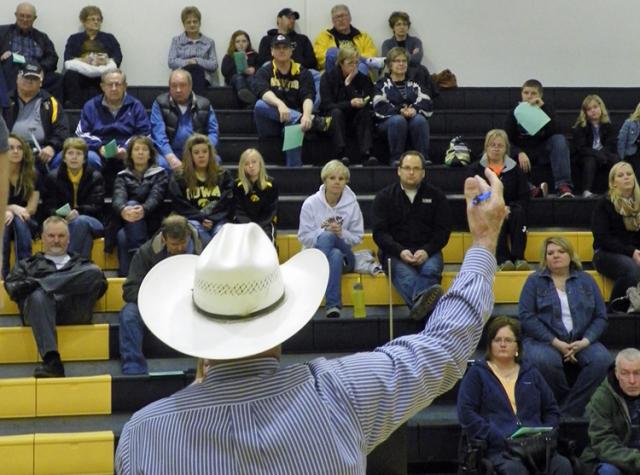
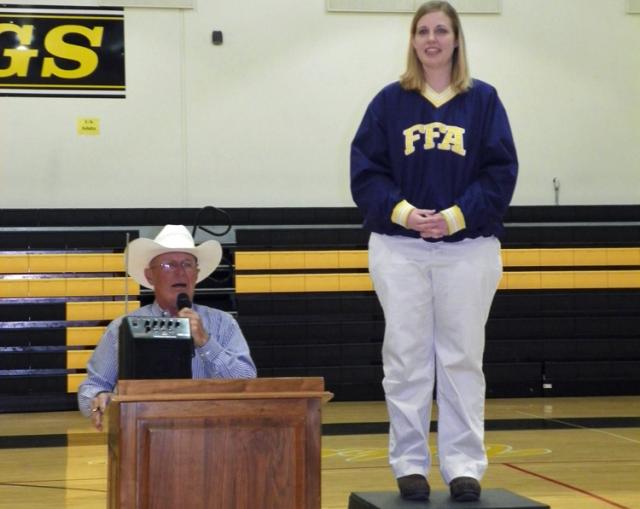
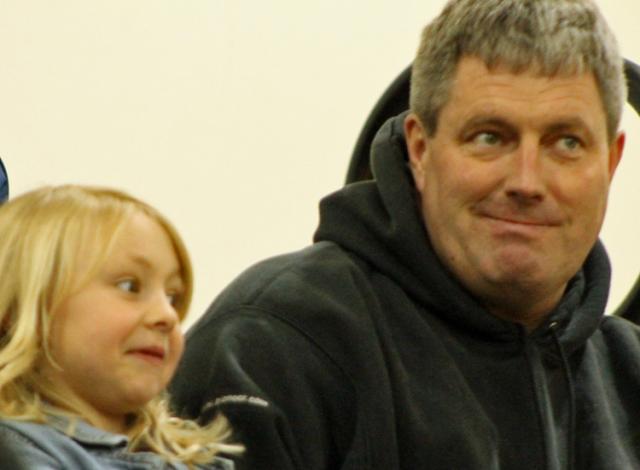
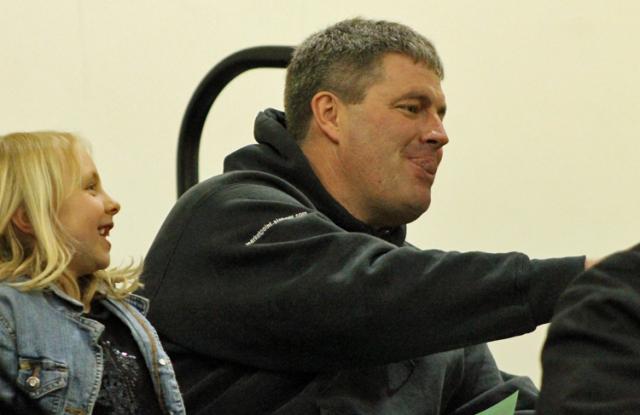
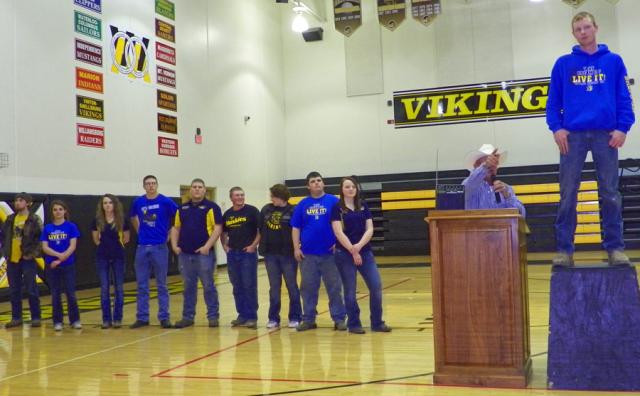
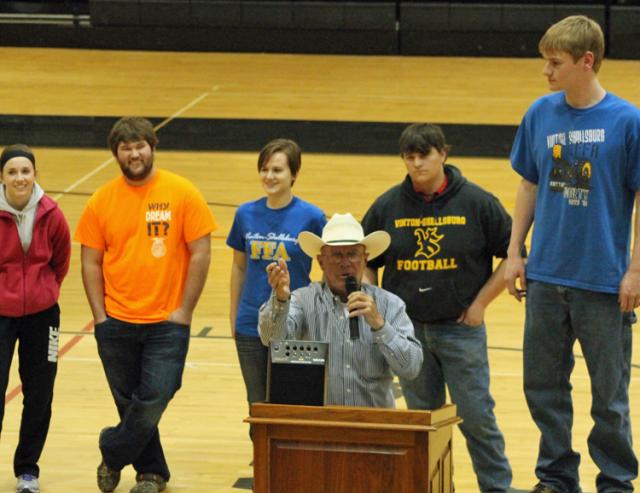
Comments
Submit a CommentPlease refresh the page to leave Comment.
Still seeing this message? Press Ctrl + F5 to do a "Hard Refresh".
Editor\'s Note: Dan, do you remember who was the auctioneer?
Please leave this part out of my post. Paul Herger, Steve Runyan (area farmers) and Kieth McGowan (Transportation Director for VS schools) Hope this helps.